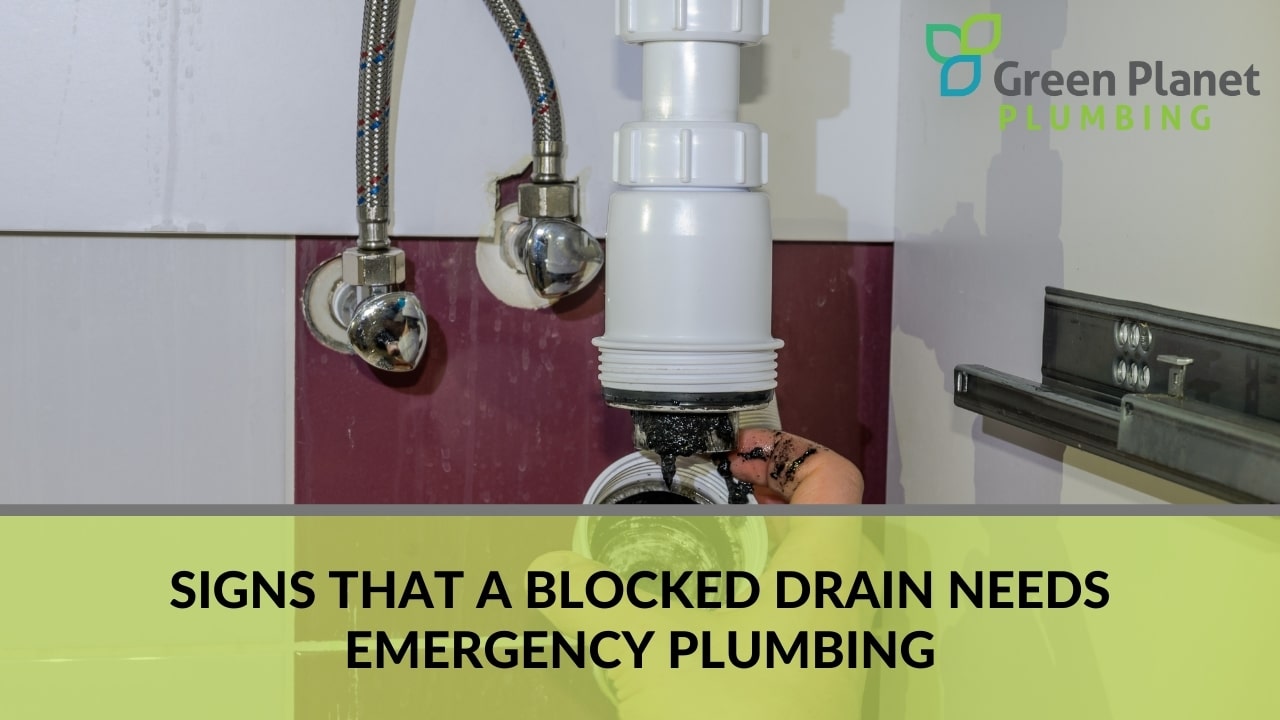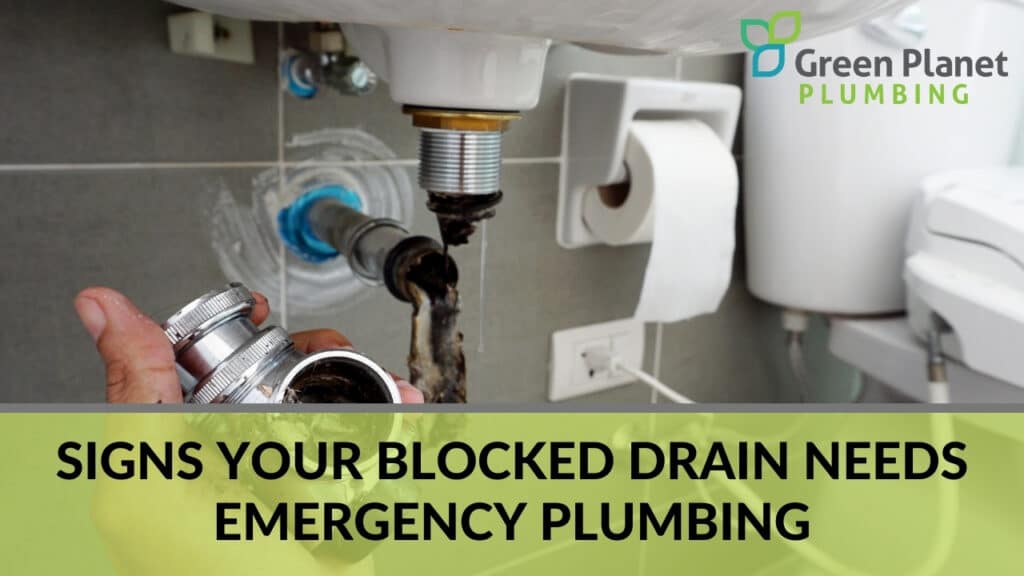Contact an emergency plumber in Maitland, Central Coast and Newcastle.
Blocked drains aren’t just bothersome; they can also cause a whole host of problems that need to be addressed as soon as possible, so it’s imperative to have an emergency plumber address the problem to avoid unnecessary costs or damage. The sooner a problem is addressed the better, so it is beneficial to spot the signs of a potential problem before its’s too late. Listed below are some important signs to watch out for and methods to prevent the problems from getting worse.

Signs That a Blocked Drain Needs Emergency Plumbing
These signs may mean that blockages are starting to form or are already present in the pipes. Among the most notable signs to watch out for regarding blocked drains are the following:
1. Slow Flow Of Water And Stagnant Water
Slow water flow is the most common sign to watch out for regarding blockages in drains. Blockages lead to a smaller diameter of available space inside the pipe through which liquid can flow. This leads to slow water flow, which can eventually also lead to stagnant water.
If stagnant water becomes a problem, other more serious issues can arise. For example, stagnant water can become a breeding ground for bacteria, fungi, and insects. These can cause health concerns, so it is imperative to address these issues immediately.
2. Water Backups
Water backups are also a tell-tale sign that clogged drains and plumbing problems are present. The worst cases can cause drains to regurgitate large amounts of water. This can also be a hygiene issue, so ensure to address the problem immediately.
3. Foul Odours
Foul smells that emanate from drains can indicate the presence of blocked pipes. But smells can still build up even if there is no visible accumulation of water. Also, stagnant water can become a breeding ground for bacteria and fungi, producing progressively worse odours.
What’s more, these odours can diffuse past the immediate area of the drain. In extreme cases, the entire home or commercial area can be affected. Call an emergency plumber as soon as odours become apparent.
4. Leaks
When drains become blocked, pressure rises inside the pipes. This can cause water to be forced out even through the smallest of openings, leading to leaks. Even if leaks weren’t present initially, prolonged blockages that remain unfixed could cause serious plumbing problems and pipe joints and weakened areas are particularly vulnerable to this.
5. Strange Noises In The Walls And Near Drains
Gurgling and clattering noises close to drains and within walls can also indicate blockages. These noises come from either the pipes getting strained or from water struggling to pass through the pipe. These plumbing problems can also be a hassle to deal with. Imagine having a peaceful night only to be disturbed by creepy sounds from within the walls. Being in that situation is not at all pleasant!
6. Frozen pipes
Most places in New South Wales, or Australia in general, don’t really have to deal with extremely cold winters. However, for the few areas in the country that do, and frozen pipes are also indicative of drain blockages.
In cold areas, still water inside pipes could freeze much faster than moving water does. This causes any still water to turn into a solid block of ice within the pipe system, further preventing water movement and causing even more plumbing problems. Not to worry too much, though, your local registered plumber can fix it.
7. Residue
There are times when powdery or scaly residue can become visible close to where drains flow. These residues can be a sign that the water has high mineral content that can also clog the drains. So, have the pipes checked for blockages caused by residues if there’s cause for concern. Also, be on the lookout for the other signs of blocked drains – the build-up of residues can compound other problems and make them worse.
8. Plants
Is there an unusual density of plants growing close to the outdoor sewer line? If there is, then this may mean that there’s a leak in that area and these leaks can be a sign that there is a blockage within the pipes. Sewer line blockage is particularly problematic – serious sewer line blocks can affect entire homes or buildings.
Causes of Blocked Drains
The types of blockages can greatly vary. This means that the methods of addressing these are different. Among the most common causes of drain blockages are the following:
- Loose hair
- Mould, mildew, and algae build-up
- Lodged objects, such as food or toys
- Pipe scaling from minerals in the water
- Grease and oil
- Tree and plant roots
- Gas build-up – gas pockets can prevent proper flow inside pipes

What Should Be Done In Case Of A Drain Emergency?
It pays to call an emergency plumber as soon as a problem becomes apparent. This doesn’t mean, however, that all the work should go to the plumber alone. Being able to help identify the problem can also help the plumber do better work and preventing the problem from getting worse is also crucial. Some good steps include:
1. Help Identify The Cause Of The Blockage
Not everything is safe to pour down the drain. If improper substances go down, these can cause blockages and other plumbing problems. Among the items that should never go down the drain include:
- Large waste and food particles.
- Anything made of plastic, rubber or non-biodegradable substances.
- Anything oil-based, like lubricants, grease, fats, and lard.
- Medicine and medical waste.
- Fibrous materials like paper, cotton, and cloth-based waste.
- Flammable and hazardous chemicals like petrol, paint, pesticides or corrosives.
These items should have separate waste disposals and should never even come close to pipes. Also, these wastes should never be mixed, if possible. Have a separate jar for chemicals, one for solid waste, one for food wastes, and so on. In case of a drain emergency, try to identify the cause of the blockage.
Similarly, just because the kitchen sink has a shredder doesn’t mean that food should be dumped down the drain. These are merely for making sure that any waste that goes down is thoroughly shredded.
Keep food waste going down the drain to a minimum. The odd piece of food here and there is okay but don’t make it a habit. This can help give the emergency plumber an idea of what to do (try Green Planet Plumbing, if you’re in Newcastle, Maitland, Lake Macquarie or the Central Coast, NSW).
2. Stop Using The Affected Drain
If a blockage is already present, stop using that sink altogether.
The same can be said of shower drains, and hair is among the peskiest drain blockers to deal with. To help solve this problem, install a shower hair catcher in shower and bathroom sink drains.
While these hair catchers don’t completely prevent hair from going down, they can effectively minimise drain issues. Same as was mentioned earlier – if hair’s the problem, stop using that drain. Wait for it to be fixed before using it again.
3. Keep an eye on water quality.
Hard water, unprocessed water, or those with high mineral contents can cause solid mineral build-ups. With this in mind, be sure to keep an eye on water quality.
A quick test is to mix water with soap – if bubbles don’t easily form, then the water may be hard (loaded with minerals like calcium). Unfortunately, this means that residues are more likely to form, risking a higher chances of drain blockages. Let the plumber know if the water is high in mineral content. This can help them solve the problem much more quickly.
4. Clean Drains Regularly
Quick cleans should be done once a week, while deep cleans once a month. The rate by which obstructions can pile up in a drain can be quite surprising. As such, it helps to do a quick clean of the drain once a week:
- Clear out debris from all drains, whether they are kitchen or bathroom drains
- Use a drain snake on shower drains often to prevent hair from building up.
- Clean the hair catcher or garbage disposal often to prevent them from getting too cluttered.
Also, weekly quick cleans aren’t enough – thorough cleaning is ideal, even just once a month. Aside from the usual cleaning methods, thorough cleaning sessions should also be done, like:
- Using a chemical drain cleaner
- Dissolving grease
- Using a siphon, but only if necessary
Take note to use non-harmful solutions when doing a deep clean. Try out products that don’t have harmful or corrosive chemicals. Better yet, use household solutions for deep cleaning. A baking soda, water, and vinegar mix is particularly effective.
Try using these cleaning items in case of a drain emergency. If they work, then all is well. If not, wait for the emergency plumber for the fix.
5. Look Out For Drain Problems And Blocked Drains.
Always exercise constant vigilance with all of the signs mentioned earlier. After all, dealing with drain problems early on can help prevent them from getting worse. When any of these signs become apparent, especially if the problems escalate, call a plumber. Many of these problems require experience to deal with – a certified plumber is sure to have that experience.

Frequently Asked Questions about Blocked Drains
Here are some FAQs regarding plumbing emergencies:
Are plumbers really necessary?
Yes! Many plumbing problems, especially the ones involving drain blockages, require ample experience to be addressed. Not just anyone has the know-how to fix these. Inexperienced hands can even make the problems worse. Call on a local emergency plumber as soon as possible. Do so before the problems become too much of a trouble to fix.
Are there quick fixes for mild blockages?
There are. For instance, pouring hot water down the drain is great for removing grease-based blockages. Water, white vinegar, and baking soda solutions, on the other hand, are excellent for helping other wastes go down. Of course, the best way is still to prevent blockages from happening. Just follow the tips mentioned above to minimise the chances of clogs.
What if the sewer itself is blocked?
In some cases, the sewer line itself can become problematic. If this is the case, call for an emergency plumbing job. This isn’t something that is easily fixable, so have someone experienced to look at the problem.
What are the qualities to look for in a plumbing company?
Not all plumbing companies are equal. There are certain qualities to look for like professionalism, experience, skill, and use of safe methods. However, among the most important is NSW certification.
The presence of a plumbing certificate is an excellent indicator that the plumbing company has well-trained employees. As such, only go for companies with certified plumbers.

Have a Certified Emergency Plumber Look at the Problem ASAP
Are you facing problems with your drain? If so, don’t wait for the problem to worsen and call a plumber as soon as you can. As we’ve mentioned earlier, not just any plumber will do. So, go for a company that has ample experience.
Luckily, those in Newcastle, Maitland, Lake Macquarie and the Central Coast will find that Green Planet Plumbing is among the best. We’ve got some of the most skilled professionals around and they’re keen to get your water flowing again.
If you would like to learn more about us, click here. Alternatively, if you have noticed any of the warning signs we have mentioned, make a booking by calling us on (02) 4911 9402 or emailing hello@greenplanetplumbing.com.au.

